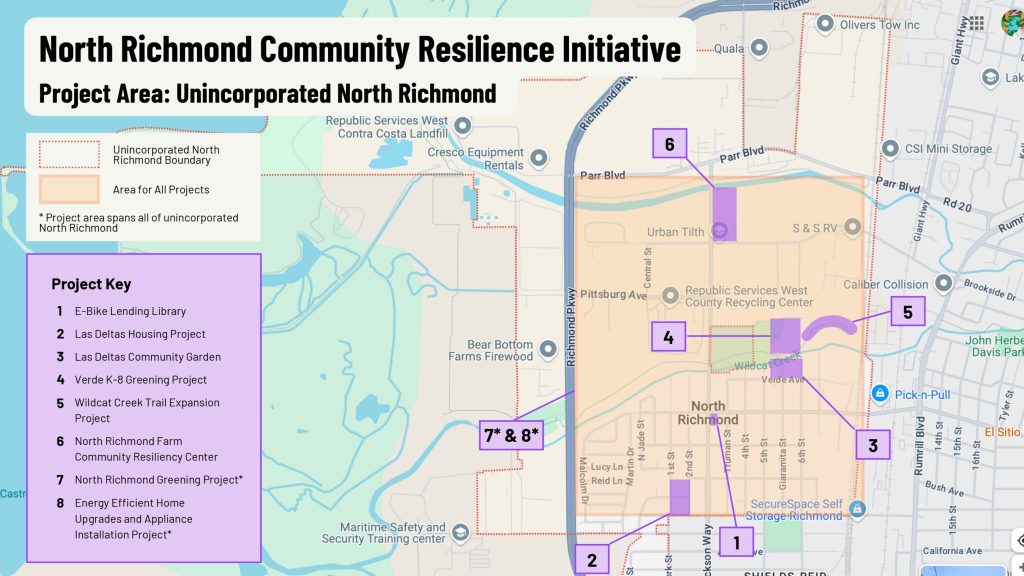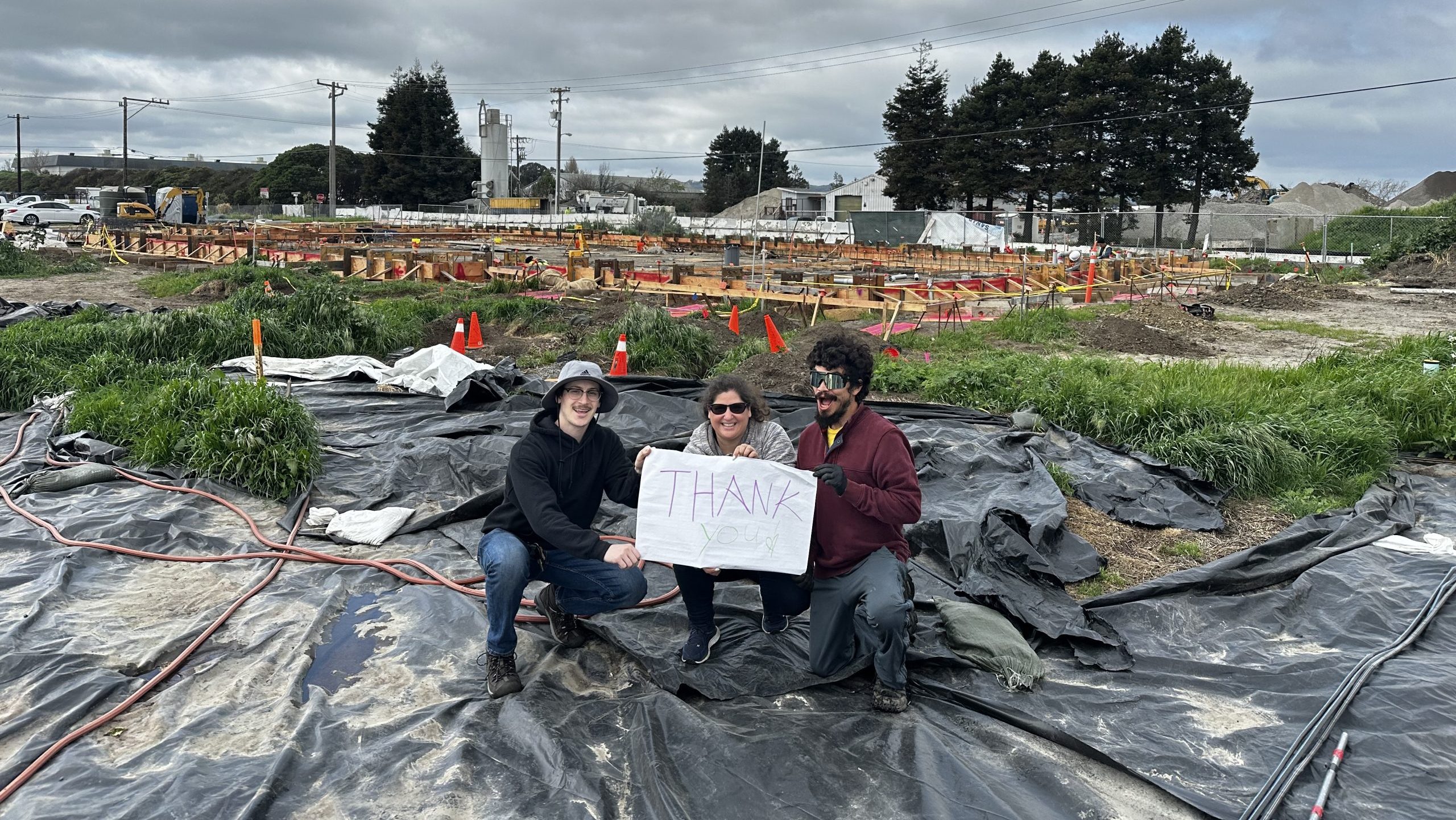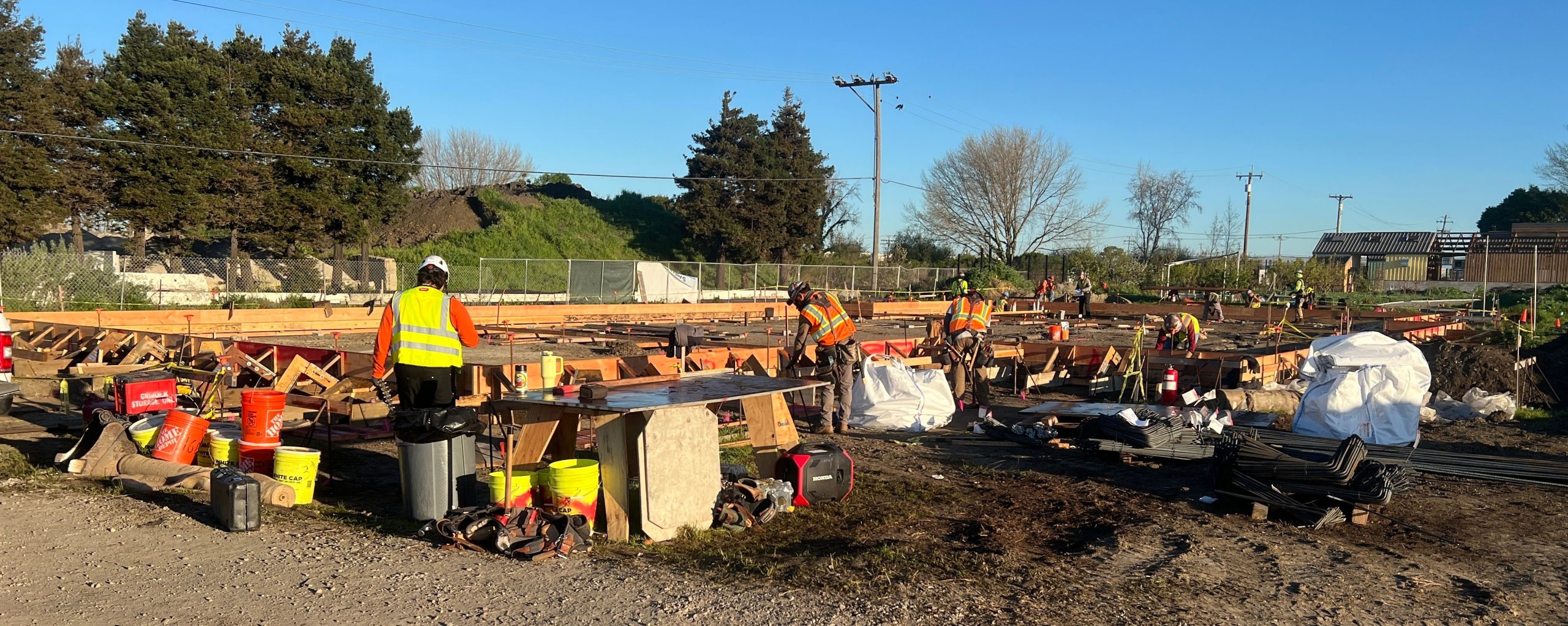EPA Grant Cancellations Threaten North Richmond’s $19M Grant and the Grants of 400 Communities Nationwide
North Richmond has been a frontline community in the fight for environmental justice. Our residents have been battling pollution, food insecurity, and decades of systemic neglect and injustice. In that fight, local organizations have led the way in revitalizing the community—transforming abandoned industrial lots into community farms and gardens, creating green jobs, and building a healthier, more resilient neighborhood from the ground up.
In 2023, a $19 million EPA grant to the North Richmond Community Resilience Initiative promised to supercharge that momentum, funding climate-resilient infrastructure, green job training, and environmental remediation. But the EPA suddenly pulled the plug—canceling the funding with no warning, no explanation, and no alternative plan. Projects stopped suddenly. Jobs threatened. And years of progress have been put in jeopardy.
Now, the fight is on to reverse that decision.
What is the The North Richmond Community Resilience Initiative?
The North Richmond Community Resilience Initiative implements targeted strategies to enhance environmental health, resilience, and economic opportunities in this disadvantaged community. The carefully selected projects work together to deliver transformative benefits while addressing critical climate and pollution challenges.
Built on strong partnerships between Contra Costa County’s Department of Conservation and Development and local organizations like Urban Tilth, the initiative leverages trusted community resources. This collaboration unites public agencies and community groups to deliver a comprehensive approach to resilience. By integrating green infrastructure, housing improvements, and mobility options, the initiative addresses challenges at multiple levels—from educational programs to capital improvements.
EPA Community Change Grant Strategies Utilized:
The core Community Change Grant climate action strategies that this project employs include:
- Strategy 1. Green Infrastructure and Nature-Based Solutions
- Strategy 2. Mobility and Transportation Options
- Strategy 3. Energy-Efficient, Healthy, and Resilient Housing and Buildings
- Strategy 5. Community Resilience Hubs
- Strategy 8. Workforce Development Programs

Projects Included:
Verde K-8 Schoolyard Greening and Regional Distribution Center Pollution Mitigation Project: Removing asphalt and planting trees to reduce emissions exposure from the nearby distribution center.
- A Regional Distribution Center is currently being built across the street from the Verde Elementary K-8 schoolyard. This will expose the schoolyard and students to extreme levels of air pollution and emissions from the heavy trucks that will regularly cycle through the facility. To combat this hazard, we will remove approximately nearly 12,000 square feet of asphalt and plant over 65 new trees, relocating 11 trees that are currently in large containers in the ground. Some of these trees will be planted along the property line that separates the schoolyard from the neighboring property and function as a tree screen to filter air pollution/ emissions from the Distribution Center. The design will also include a water-conserving irrigation system, as well as trees and green spaces on the playground and the kinderyard.
North Richmond Home Energy Infrastructure Enhancement Program: Retrofitting 40 homes to be fully electric, improving indoor air quality and reducing greenhouse gas emissions.
- The County will support infrastructure improvements for comprehensive whole home electric retrofits for 40 qualified single-family and multi-family homes. Home appliance upgrades covered by the Program will include heat pump heating, ventilation, and air conditioning (HVAC) systems and water heaters, induction cooktops, heat pump clothes dryers, solar panels, electric panel upgrades, and battery storage. The program will be designed to maximize GHG emissions reductions based on the home improvement needs of each residential building. All qualified electric home improvement projects will be completed at no cost to the property.
- The North Richmond Energy Enhancement Rebate Program will fully fund qualified electric home improvement projects. These projects will lead to significant direct health benefits for residents by improving indoor air quality by eliminating the combustion byproducts associated with burning fossil fuels and will help eliminate greenhouse gas emissions in communities most impacted by climate change. The Program may include environmental remediation if necessary, such as removal of mold or asbestos. Specialized outreach in coordination with local community-based organizations will be made to educate residents who are most sensitive to indoor air pollution about the program including low-income households and those living in older homes. The CHDC – Las Deltas redevelopment project will also ensure indoor air quality improvements by including in redevelopment designs the installation of a MERV 13 air filtration system, solar panels with battery back-ups, installation of all-electric heat pumps (for space heating/cooling and water heating), Energy Star electric appliances, sustainable building materials, and low e windows.
Las Deltas Anti-Displacement and Housing Security Project: Retrofitting and greening four former Las Deltas housing units to be energy-efficient homes for displaced residents.
- This project will implement green infrastructure and energy resiliency features such as all-electric appliances, rooftop solar energy generation, and drought tolerant landscaping in four vacant and blighted duplex properties located near Verde School and formerly a part of the Las Deltas Housing Project owned and operated by the Housing Authority of Contra Costa County. These units will be renovated and offered to eligible first-time home buyers as four single-family homes with special outreach to former Las Deltas public housing residents who were displaced when the Las Deltas campus was closed. Former Las Deltas residents and North Richmond residents will be prioritized for home buyer selection to help address area housing insecurity.
- CHDC will rehabilitate and convert four duplex properties into four single-family homes. CHDC will sell the end product to eligible first time home buyers at or below 80% of the area median income. These properties are currently vacant and blighted and located nearby the Verde Elementary neighborhood. The priority for ownership will be former Las Deltas residents and then other current and or past residents of North Richmond. The single-family homes are expected to have 2-5 bedrooms and 2-3 bathrooms. Pollution reduction measures include installation of indoor air filtration within each unit, a MERV 13 air filtration system, build in infrastructure for solar panels with battery, storm water pollution prevention, on site water retention system, light pollution reduction, cutoff luminaires, sustainable lighting fixtures and controls, installation of all-electric heat pumps, and heat pump water heaters, Energy Star electric appliances, water conserving plumbing fixtures, sustainable building materials such as recycled cement board siding, sustainable insulation, locally engineered sustainable flooring, cool roofing materials , fire sprinkler systems,, install exterior security system perspective buyers will have opportunity to eliminate or keep services upon acquisition, non-toxic and low VOC paints and sealants and dual pane low e-windows. Drought-tolerant and resistant plants, and shade trees and California native plants will be planted. Low flow irrigation landscaping will be installed.
Las Deltas Community Garden: Creating green spaces and a community garden on former blighted properties to promote community engagement and environmental education.
- This project, led by Richmond LAND, will remove 10 dilapidated and vacant units on two sites formerly managed by the Contra Costa County Housing Authority program. The sites are 0.84 acres in surface area and adjacent to Wildcat Creek and Verde Elementary School. The blighted buildings will be demolished to create a community garden and green gathering spaces on both sites. This will offer opportunities for environmental education, workforce development, and community engagement. The community garden will serve a connected housing development project called the Tiny Home Eco Village that will bring 16-22 new affordable housing units to North Richmond residents. The housing development project will serve households with an average 50% AMI. Project activities include demolition of the existing vacant and dilapidated housing units, installing site drainage, water-conserving irrigation, water meters, as well as community garden amenities such as a tool shed, picnic tables, shade structure, and planter boxes. We will install 10-20 8’x4’ planter boxes throughout both sites, and install approximately 100 pollinator plants throughout both sites to help catalyze the community garden. We will also activate the sites with community programming in partnership with local schools and nonprofits non-profits.
- Learn more: www.richmondland.org
- Contact email: info@richmondland.org
- Donate to Richmond LAND: https://www.richmondland.org/donate
Urban Tree Canopy Project: Expanding tree planting efforts to reduce heat islands and improve air quality.
- This project will scale up existing efforts to increase North Richmond’s urban forest by adding to the neighborhood’s tree canopy in yards and on public right-of-way strips along these streets. This will increase walkability and reduce heat islands and air pollution in North Richmond, and address an important inequity in Contra Costa County. A successful pilot project conducted by The Watershed Project in collaboration with the Contra Costa County Watershed Program has already planted 85 trees; tree planting would be able to continue as part of this Initiative.
Creek Stewardship: Restoring the Wildcat Creek Watershed to reduce flood risk and improve water quality.
- The Creek Stewardship Project aims to restore and enhance the ecological health of the Wildcat Creek Watershed, reducing flooding and fire risk, and promoting biodiversity and improving water quality. This initiative will focus on removing invasive vegetation and planting riparian native plants in this vital waterway. By engaging community volunteers in hands-on stewardship activities, the Creek Stewardship Project will foster environmental awareness, stewardship, and social cohesion, while creating a healthier and more resilient creek ecosystem.
- Water is a precious resource, especially in this era of climate change and climate emergencies such as wildfire and drought. Our landscaping and infrastructure improvements include refurbishing the Wildcat Creek Watershed that had been accumulating illegal dumping and runoff contamination into cleaner inlets to the bay area watersheds reducing flooding and fire risk, and promoting biodiversity and improving water quality and cleaner discharges into our local creeks and to the San Francisco Bay. By engaging community volunteers in hands-on stewardship activities, the program fosters environmental awareness, stewardship, and social cohesion, while creating a healthier, more resilient creek ecosystem. .Our programming also provides information on how to adapt to lower water consumption lifestyles. Rain gardens and passive nature-based landscaping will collect rainwater and slow the progression of runoff into the two nearby creeks that lead into the San Francisco Bay. Rain collection will be matched to filtration systems for emergency access to potable water.
- Collectively, these pollution reduction strategies work in synergy to address the interconnected environmental issues that North Richmond faces, helping to create a healthier, more resilient community capable of thriving in the face of ongoing environmental challenges.
Wildcat Creek Trail Improvements: Enhancing active transportation and flood resilience through trail improvements.
- This project will improve active transportation access to Verde Elementary and ultimately help connect the North Richmond community safely and directly to the San Francisco Bay shoreline and the Regional Bay Trail. Wildcat Creek, which runs adjacent to Verde Elementary school, is a crucial flood control channel draining waters upland of North Richmond, through North Richmond, and out to the San Francisco Bay. This creek also acts as a flood buffer zone protecting North Richmond residents from peak rain events. This project is part of the larger Wildcat Creek Fish Passage Benefits Plan which will improve fish passage and reduce flooding risk by increasing the size of the sediment basin along Wildcat Creek. In order to retain the trail access that will be displaced by the fish ladder and trail sediment basin improvements, this project will resurface and add an additional mile of trail infrastructure to the site connecting Verde Elementary to the Richmond Parkway in anticipation of the construction of a new overpass which will safely connect the North Richmond community to the shoreline. All construction will follow Bay Trail Standards, which include ensuring storm water runoff from the trail is managed with sheet drainage directed to a system of water quality control features or through use of permeable paving materials. Neighborhood residents, community members, and tribal Consultants from the Confederated Villages of Lisjan were also consulted and approved the plan. The Watershed Project will continue to conduct community outreach, informing Tribal and community stakeholders on progress and timeline, assuring that their approved design preferences are implemented, and providing further community input as needed.
E-Bike Lending Library: Providing zero-emission transportation options through a community-led e-bike program, reducing greenhouse gas emissions and promoting physical activity.
- The E-Bike Lending Library (120 bikes) will help integrate e-bike use which supports the community’s effort to improve the county’s growing zero-emissions transportation infrastructure. Community members can check out bikes, take free classes, and get help and support with every aspect of having an e-bike as a flexible, accessible, and useful mode of transportation. The Lending Library will create a VTM “Volunteer, Training, Maintenance” road to ownership program which will allow community members to receive an e-bike upon program completion. E-bikes reduce greenhouse gas emissions and decrease traffic congestion. By replacing short car trips with e-bike rides, pollutants such as nitrogen oxides and particulate matter are reduced, contributing to better overall health.
- The E-Bike Lending Library will provide alternative transportation options that will reduce traffic on the road, which will help reduce GHG emissions. E-bikes also promote physical activity, which support improved community health outcomes.
- These interventions are vital for North Richmond, where high levels of diesel particulates and industrial emissions have severely impacted respiratory health, particularly for vulnerable populations like children and the elderly.
North Richmond Farm Resiliency Center (CRC): Establishing a fully operational Community Resilience Center (CRC) that offers emergency response support, food access, job training, and wellness programs.
- The North Richmond Farm Resiliency Center (detailed in Strategy 5 below) is being developed in accordance with sustainable design practices: the building’s air filtration and HVAC systems will enable the Resiliency Center to also be used as a Breathing Center during clean air emergencies. During power outages its photovoltaic system with battery backup will support the HVAC, refrigeration units and power and communications for up to three days off grid.
- Urban Tilth will develop and build a community resiliency center at the North Richmond Farm, which is walking distance from Verde Elementary, to serve the North Richmond Community in the event of an emergency or disaster, such as refinery accidents and when wildfire smoke reaches dangerous levels, and year-round to build community resilience. In times of emergency, the space is prepared to house community members with cots, first aid equipment, portable showers, and additional restroom facilities. The building’s air filtration and HVAC systems will enable the Resiliency Center to also be used as a Breathing Center during clean air emergencies. During power outages our photovoltaic system with battery backup will support the HVAC, refrigeration units and power and communications for up to three days off the grid.
- When we are not experiencing a disaster, the Community Resilience Center will provide the new Farm Store, the only location in North Richmond where residents can access fresh local and sustainably grown produce 7 days a week, an expanded fruit and vegetable wash and pack facility with walk-in cooler and freezers, supporting expanded CSA and Veggie RX produce distribution to over 600 families each week, 48 weeks a year. A community commercial kitchen will give our staff access to the equipment and appliances needed to prepare, store, and distribute food to the public. We will also develop a Children’s Garden (primarily grades K-6), where we will provide age-appropriate afterschool programs and education on nutrition and other health topics, as their parents participate in related, supportive CRC wellness programs. There will also be a community room where residents can organize and host community meetings, workshops, trainings, and events year-round:
- Free Certification Training: In order to ensure that more local residents can be of assistance during emergencies we will host a series of emergency response, first aid, and CPR trainings for at least 200 North Richmond women, seniors, and youth.
- Health Kit Distribution: Along with developing a disaster response plan that makes sense for key populations in our community we want to offer mutual aid in the form of wildfire and respiratory health kits distributed through the community each year during fire season to help he many North Richmond Residents who suffer from chronic asthma as a result of cumulative emissions from the oil refinery, port, landfill, railroad lines and 3 highways. These clean air threats become exacerbated during California’s ever-lengthening fire season.
- Job Training: There will be workforce training for populations with barriers to entry such as youth, houseless residents, and formerly incarcerated individuals.
- Health and Wellness Activities and Classes: These weekly activities for our seniors and families will promote overall wellness by promoting cooking, nutrition, exercise classes, and social interaction.
- The project will also focus on offering specialized support for the considerable number of North Richmond immigrant residents who lack opportunities for quality work, housing, healthcare, healthy food, and disaster relief. Bringing these services right to our CRC will also bridge a geographical gap for those living far from The Latina Center’s central Richmond location.
- The North Richmond Farm Resilience Center serves as a central hub for this work, offering not only emergency preparedness resources but also year-round programs in food security, wellness, and climate resilience education and trainings for youth and marginalized groups, providing pathways to meaningful employment in green industries. This holistic approach empowers the community by addressing the root causes of environmental vulnerability, improving public health, and creating economic opportunities.
Urban Farming Fellowship (at CRC): Training in sustainable and regenerative farming practices.
- Rudy Lozito Urban Agriculture Fellowship: Host 4 West Contra County adults annually for training in sustainable and regenerative farming practices. These practices include: seasonal organic crop production, minimal till farming, soil based carbon sequestration techniques, animal husbandry / poultry farming, and nourishing the soil, while working alongside staff to steward the land and cultivate resources for our community. The 7 month fellowship will be compensated at $20/hour and includes basic benefits such as sick leave, holidays, and wellness fund allocation.
Watershed Restoration Training (at CRC): Training in watershed restoration practices..
Basins of Relations Watershed Restoration and Conservation Training Program: Trains young people from West Contra Costa County to become stewards of their watersheds, communities, and the creeks that run through them. Employs and trains 8-10 Watershed Restoration apprentices annually to contribute to restoration projects and leading watershed awareness programs. This paid 15-week intensive program will help them support their local watershed, their community, and their own careers.
Introductory Arborist Training (at CRC): Training in fruit tree anatomy and arborist skills.
Orchard for ALL Tree Care Training Program: Will create a community orchard, using hundreds of Richmond backyards to increase access to healthy, delicious fruit for families who struggle with food insecurity. We hope to address the inaccessibility of fresh fruits in Richmond and uplift our youth through employment training and opportunities, to grow their civic engagement within their community. We hire and train 8 youth each year. After 6 weeks of training, they will have the opportunity to be hired onto our year-round team. These skills will help young people secure higher-paying jobs in land management or encourage them to pursue ecological fields.
Summer Youth Apprentice Training (at CRC): Training in environmental justice, food justice, and food sovereignty.
Summer Youth Apprentice Program: Hosts 40 West County youth at community garden, creek restoration, and farming sites across Richmond, CA where the youth will spend 6-weeks (100 hours) learning about environmental justice, food justice, and food sovereignty and working alongside our staff to steward land, and cultivate resources our community! The program includes workshops, field trips, guest speakers from people working various environmental, farming, social justice and land management fields, hands on learning work days, and a camping trip!
TWP Green Collar Corps: Training local youth in environmental careers through hands-on work in urban forestry, creek restoration, and other sustainability initiatives.
The Watershed Project’s Green Collar Corps (GCC) is an intensive youth employment program aimed at empowering local youth aged 17-24 to become future leaders in the environmental field. With a focus on multi-disciplinary skills training and hands-on work experience alongside environmental professionals, the program will employ 4-5 GCC members each year, who will also mentor an additional 100 young people from Richmond during the 30-month grant period. Participants will receive an hourly stipend of $20, which exceeds California’s minimum wage. The GCC program consists of three main components: 1) Team-building field trips: Water quality monitoring and shoreline restoration at various locations within the Richmond watershed. 2) Year-long career development academy: Monthly training sessions on topics such as equity and environmental justice, resume writing, leadership skills, and urban ecology; Hands-on projects in Urban Forestry and Creek Restoration; Play a key role in K-8 watershed education.
Contact Us
Urban Tilth
Doria Robinson, doria@urbantilth.org. 510-778-5886 (Lead grant writer)
Marcos Floriano, chito@urbantilth.org, 510-910-5272
Dawn Rose, Communications Manager, dawn@urbantilth.org, 510-219-0903
Verde K-8 Project
Adam Boisvert, Education Manager, (858) 335-3255
Jill Mercurio, Construction Project Manager, mercurioengineering@astound.net
Community Housing Development Corporation, CHDC (Las Deltas)
Norma Thompson, normathom@comcast.net, 510-604-8008
Rebecca Kilmartin, rkilmartin@communityhdc.org, (510)221-2509 ext.=209
Richmond LAND (Las Deltas)
Princess Robinson | 510-478-7808 | princess@richmondland.org
The Watershed Project
Juliana Gonzalez, juliana@thewatershedproject.org 510-2244085
Contra Costa County
Jody London, Jody.London@dcd.cccounty.us, 925-655-2815
Demian Hardman-Saldana, Demian.Hardman@dcd.cccounty.us, 925-655-2816
County Flood Control
Gus Amirzehni, Gus.Amirzehni@pw.cccounty.us, 925.313.2128
Tim Jensen, Tim.Jensen@pw.cccounty.us
Rich City Rides
Mayeli Rico, 415-465-9232 mayeli@richcityrides.org
Najari Smith, 347-721-7295 najari@richcityrides.org

Speak up NOW!
SIGN THE PETITION demanding Congress restore the 800+ terminated IRA-funded grants impacting communities nationwide. By signing, an email will send directly to your elected representative.
GET ACTION ALERTS in your inbox by signing up for our Just Transition newsletter.
EPA Community Change Grant Timeline
- November 21, 2023
- EPA CC Grant open and accepting submissions
- April 9, 2025
- Convened a collaborative of North Richmond organizations to begin pulling together and deciding on projects we would include in the grant application
- September 13, 2024
- Submitted grant application
- October 25, 2024
- EPA gave notice that grant passed 1st level of review and was moving forward in the review process “The application has been reviewed in accordance with applicable requirements, including the threshold eligibility criteria found in Section III.D of the NOFO, and we are pleased to inform you that the application appears to meet the threshold eligibility requirements and will proceed to merit review.” EPA Officer
- December 2, 2024
- Received notice that the grant was selected!
- Contra Costa County, the lead applicant, worked for 4 weeks with EPA staff on contracting requirements
- January 6, 2025
- Secured executed contract
- January 23, 2025
- Received notice from the EPA that our ASAP enrollment was complete.
- January 31, 2025
- ASAP status change to Suspended (no official notice received from EPA)
- February 11, 2025
- Lost contact with the EPA District 9 Grant Administrator
- Learned that the EPA District 9 Grant Administrator was fired due to probationary status
- February 19, 2025
- Grant status changed to Open. (No official notice received from EPA)
- March 10, 2025
- ASAP status change to Suspended (no official notice received from EPA)
- March 27, 2025
- Learned the North Richmond Resiliency Project Grant is on the list of 400 grants to be cancelled by the EPA
- April 2, 2025
- The project team was informed by Supervisor John Gioia via an email from Congressman Garamendi’s DC office that our grant was “cancelled”; the Congressman’s office was told we were notified, but we were not (no official notice received from the EPA).
- April 16, 2025
- The court issues a preliminary injunction ordering the EPA / Administration to release all frozen funds, including our grant.
- April 19, 2025
- ASAP status has not changed; it is still suspended with no access to EPA CCG funds (still no official notice received from EPA by Contra Costa County, the lead applicant/awardee).
- April 21, 2025
- Congressmen Garamendi and DeSaulnier sent a letter to U.S. EPA Administrator Lee Zeldin demanding reinstatement of the Community Change Grant for the North Richmond Community Resilience Initiative.
- April 29, 2025
- US EPA is cancelling all environmental justice grants, the Washington Post reports.
- Grant access was also changed to active, and funds were made available.
- May 2, 2025
- Contra Costa County received word that the EPA is formally terminating our Community Change Grant (as well as 800 other IRA-funded grants across the nation).
- May 19, 2025
- Urban Tilth launches a national petition, demanding Congress restore the 800+ terminated IRA-funded grants impacting communities nationwide. Sign the petition today!



